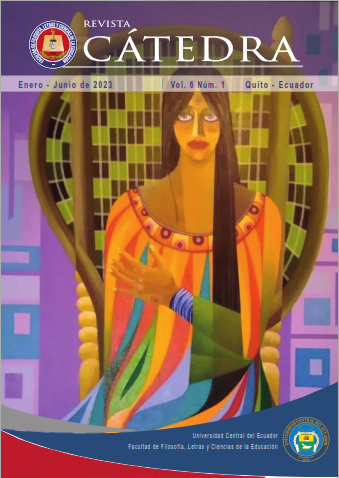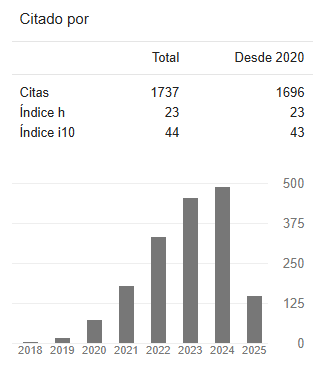Inclusive methods for reading ability: case of students with moderate intellectual disability
DOI:
https://doi.org/10.29166/catedra.v6i1.3493Keywords:
Learning, reading, disability, inclusive methods, reading skillsAbstract
This article deals with inclusive methods as methodological strategies and their scope in addressing the reading ability of students with moderate intellectual disabilities. The teachers' lack of knowledge and little mastery of inclusive topics limit their capacity to respond to individual and diverse demands. The critical vision of four experts on the subject nourished the research task and allowed confronting the development of real practices with the pertinent ones. The basic objectives made it possible to describe the characteristics of inclusive methods and to evaluate the reading ability developed by students with moderate intellectual disabilities; through a reading test, the strengths and weaknesses in the linguistic area were evidenced. The analytical and deductive methods were evidenced in the study, constituting valid references for obtaining reliable data. The relevant results obtained in the test allowed concluding that, at an average level, the reading ability of the student group is in the process of being acquired, being viable the incorporation of inclusive initiatives oriented to the continuous improvement of the reading development. The presentation of texts with images is a valid option since it facilitates the comprehension and interpretation of the topics addressed.
Downloads
References
Alarcón y Benito (2019). El sistema educativo finlandés y el aprendizaje invisible. Pedagogías Emergentes en la Sociedad Digital, 167-168. https://www.researchgate.net/profile/Pablo-Rivera-Vargas/publication/333093010_EL_SISTEMA_EDUCATIVO_FINLANDES_Y_EL_APRENDIZAJE_INVISIBLE/links/5cdb4ead458515712eac101c/
Alcaraz y Arnaiz (2019). La escolarización del alumnado con necesidades educativas especiales en España: un estudio longitudinal. Revista Colombiana de Educación, 1(78), 317. https://doi.org/10.17227/rce.num78-10357
Bastidas y Briones (2020). Las adaptaciones curriculares en el proceso de aprendizaje de estudiantes con discapacidad intelectual leve de 8vo de educación general básica de la unidad educativa san esteban diácono en el periodo lectivo 2020-2021. Guayaquil-Ecuador: Universidad Laica Vicente Rocafuerte de Guayaquil. Obtenido de http://repositorio.ulvr.edu.ec/handle/44000/4196
Cornejo, C. (2017). Respuesta educativa en la atención a la diversidad desde la perspectiva de profesionales de apoyo. (U. P. Nacional., Ed.) Revista Colombiana de Educación. 73 (78) http://www.redalyc.org/articulo.oa?id=413651843005
Gallo y Naranjo. (2021). Efectividad de la inclusión pedagógica de los estudiantes con discapacidad intelectual en las Unidades Educativas Fiscales del circuito 06-11 de la ciudad de Latacunga. Uniandes EPISTEME. 8 (135). . http://45.238.216.13/ojs/index.php/EPISTEME/article/view/1967
García, M. M. (2017). La educación inclusiva como mecanismo de garantía de la igualdad de oportunidades y no discriminación de las personas con discapacidad.Una propuesta de estrategias pedagógicas inclusivas. Jaén-España: Jaén:Universidad de Jaén. Obtenido de http://hdl.handle.net/10953/
Guayasamín, N. T. (2019). Estrategias didácticas a través de la adaptación de textos con imágenes para el fortalecimiento de la comprensión lectora. Quito-Ecuador: Quito:UCE. http://www.dspace.uce.edu.ec/handle/25000/19729
Lara, M. E. (2020). Adaptaciones curriculares para estudiantes con necesidades educativas especiales no asociadas a la discapacidad en el Área de Lengua y Literatura en el 1ro BGU de la Unidad Educativa Patrimonio de la Humanidad, año 2018-2019. Quito-Ecuador: Universidad Central del Ecuador. http://www.dspace.uce.edu.ec/handle/25000/20937
López, G. E. (2015). Niños y adolescentes con necesidades educativas especiales. Revista Médica Clínica Las Condes., 26, 47. https://doi.org/10.1016/j.rmclc.2015.02.004
Morán-Alvarado, M., Vera-Miranda, L. y Morán-Franco, M. (2017). Los trastornos del lenguaje y las Necesidades Educativas Especiales.Consideraciones para la atención en la escuela. Revista Universidad y Sociedad, 9(3), 194. http://scielo.sld.cu/scielo.php?script=sci_arttext&pid=S2218-36202017000300030
Ocampo, A. (2016) ¿Cómo fomentar la lectura en niños y jóvenes con discapacidad?: desafíos desde la educación inclusiva y la neurodidáctica. (C. d. (CELEI), Ed.) Jaén, España. Obtenido de http://hdl.handle.net/11181/5575
Quevedo-Álava, R., Pazmiño-Campuzano, M. y San Andrés-Laz, E. (2020). La educación inclusiva y su aporte en la práctica docente Portoviejo –Ecuador. Revista científica Dominio de las Ciencias., 6, 192. http://dx.doi.org/10.23857/dc.v6i3.1213
Ricoy, A. J. (30 de Marzo de 2018). Formación docente y su relación con los contextos inclusivos. Revista Internacional de Apoyo a la Inclusión, Logopedia, Sociedad y Multiculturalidad., 4, 162. https://doi.org/10.17561/riai.v4.n2.9
Tobón y Cuesta (2020). Diseño universal de aprendizaje y currículo. Sophia-Educación, 16(2), 168. https://doi.org/10.18634/sophiaj.16v.2i.957
UNESCO. (Octubre de 2020). Enseñanza inclusiva: Preparar a todos los docentes para enseñar a todos los alumnos. https://unesdoc.unesco.org/ark:/48223/pf0000374447_spa.locale=es
Viero-Iglesias (2015). Estrategias visuales para el manejo autónomo de TIC en discapacidad intelectual severa. Revista de estudios e investigación en psicología y educación. 13, https://revistas.udc.es/index.php/reipe/issue/view/57
Vivanco, J. S. (2020). Características del lenguaje en la discapacidad intelectual moderada. Quito: Universidad Central del Ecuador. http://www.dspace.uce.edu.ec/handle/25000/22500
Wengrowicz, A. (2020). Universidad y discapacidad. El uso de las tecnologías en la enseñanza de las disciplinas proyectuales: estrategias didácticas que favorecen la educación inclusiva. Buenos Aires-Argentina. https://dialnet.unirioja.es/servlet/articulo?codigo=7869101
Yépez, A. G. (2017). Metodologías educativas en el contexto socieducativo. Retos de la ciencia, 1, 132. https://retosdelacienciaec.com/Revistas/index.php/retos/article/view/135









